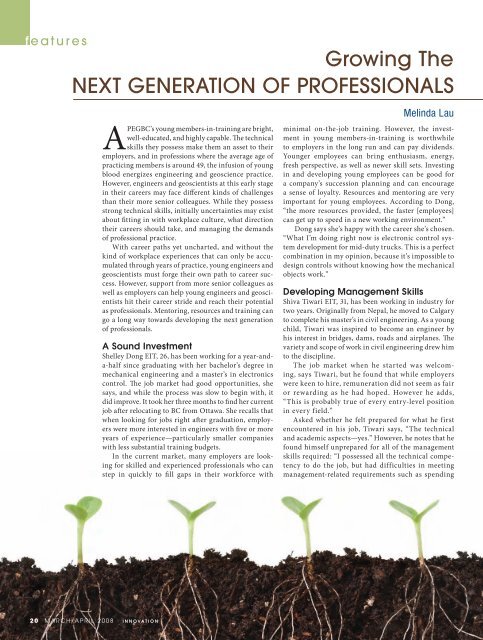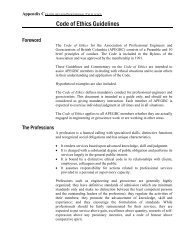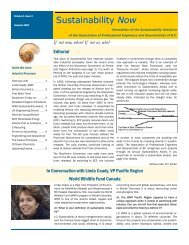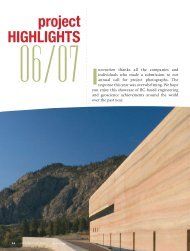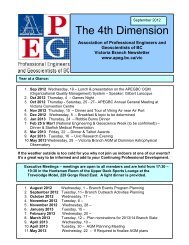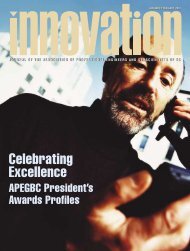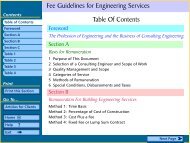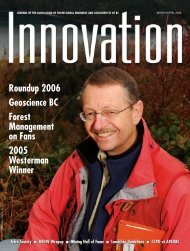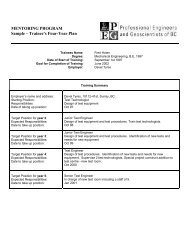3938 APEG Mar.Apr Edit.indd - APEGBC
3938 APEG Mar.Apr Edit.indd - APEGBC
3938 APEG Mar.Apr Edit.indd - APEGBC
You also want an ePaper? Increase the reach of your titles
YUMPU automatically turns print PDFs into web optimized ePapers that Google loves.
f eatures<br />
Growing The<br />
NEXT GENERATION OF PROFESSIONALS<br />
20 MARCH/APRIL 2008 INNOVATION<br />
<strong>APEG</strong>BC’s young members-in-training are bright,<br />
well-educated, and highly capable. Th e technical<br />
skills they possess make them an asset to their<br />
employers, and in professions where the average age of<br />
practicing members is around 49, the infusion of young<br />
blood energizes engineering and geoscience practice.<br />
However, engineers and geoscientists at this early stage<br />
in their careers may face diff erent kinds of challenges<br />
than their more senior colleagues. While they possess<br />
strong technical skills, initially uncertainties may exist<br />
about fi tting in with workplace culture, what direction<br />
their careers should take, and managing the demands<br />
of professional practice.<br />
With career paths yet uncharted, and without the<br />
kind of workplace experiences that can only be accumulated<br />
through years of practice, young engineers and<br />
geoscientists must forge their own path to career success.<br />
However, support from more senior colleagues as<br />
well as employers can help young engineers and geoscientists<br />
hit their career stride and reach their potential<br />
as professionals. Mentoring, resources and training can<br />
go a long way towards developing the next generation<br />
of professionals.<br />
A Sound Investment<br />
Shelley Dong EIT, 26, has been working for a year-anda-half<br />
since graduating with her bachelor’s degree in<br />
mechanical engineering and a master’s in electronics<br />
control. Th e job market had good opportunities, she<br />
says, and while the process was slow to begin with, it<br />
did improve. It took her three months to fi nd her current<br />
job aft er relocating to BC from Ottawa. She recalls that<br />
when looking for jobs right aft er graduation, employers<br />
were more interested in engineers with fi ve or more<br />
years of experience—particularly smaller companies<br />
with less substantial training budgets.<br />
In the current market, many employers are looking<br />
for skilled and experienced professionals who can<br />
step in quickly to fi ll gaps in their workforce with<br />
Melinda Lau<br />
minimal on-the-job training. However, the investment<br />
in young members-in-training is worthwhile<br />
to employers in the long run and can pay dividends.<br />
Younger employees can bring enthusiasm, energy,<br />
fresh perspective, as well as newer skill sets. Investing<br />
in and developing young employees can be good for<br />
a company’s succession planning and can encourage<br />
a sense of loyalty. Resources and mentoring are very<br />
important for young employees. According to Dong,<br />
“the more resources provided, the faster [employees]<br />
can get up to speed in a new working environment.”<br />
Dong says she’s happy with the career she’s chosen.<br />
“What I’m doing right now is electronic control system<br />
development for mid-duty trucks. This is a perfect<br />
combination in my opinion, because it’s impossible to<br />
design controls without knowing how the mechanical<br />
objects work.”<br />
Developing Management Skills<br />
Shiva Tiwari EIT, 31, has been working in industry for<br />
two years. Originally from Nepal, he moved to Calgary<br />
to complete his master’s in civil engineering. As a young<br />
child, Tiwari was inspired to become an engineer by<br />
his interest in bridges, dams, roads and airplanes. Th e<br />
variety and scope of work in civil engineering drew him<br />
to the discipline.<br />
The job market when he started was welcoming,<br />
says Tiwari, but he found that while employers<br />
were keen to hire, remuneration did not seem as fair<br />
or rewarding as he had hoped. However he adds,<br />
“This is probably true of every entry-level position<br />
in every field.”<br />
Asked whether he felt prepared for what he first<br />
encountered in his job, Tiwari says, “The technical<br />
and academic aspects—yes.” However, he notes that he<br />
found himself unprepared for all of the management<br />
skills required: “I possessed all the technical competency<br />
to do the job, but had difficulties in meeting<br />
management-related requirements such as spending


